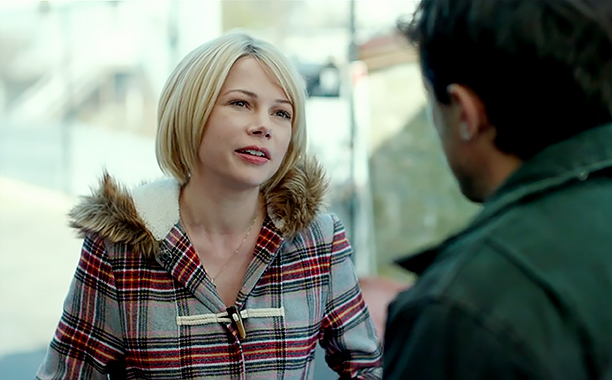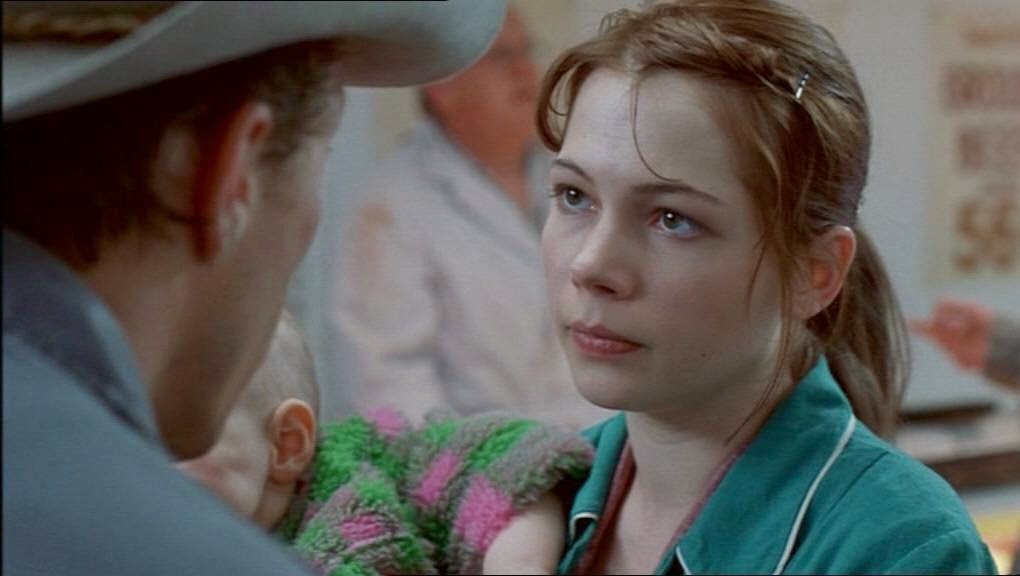5. Manchester by the Sea (2016)

For an extremely limited amount of screen time Michelle Williams scored her fourth and most recent Academy Award nomination for her supporting role as Randi Chandler in Manchester by the Sea (2016).
Lee, played by Casey Affleck in his Academy Award winning performance, returns to his home town following his brother’s death. He has been named his nephew’s guardian. Lee left his home town years earlier due to an unimaginable tragedy which led him to separate from his wife Randi. Flashbacks interspersed throughout the film inform the viewer slowly of Lee’s tragic history and how this particular place is home to a great deal of grief and loss.
Williams has played many women over the years that face tragic and upsetting circumstances, but Randi may be the most heartbreaking character she has played yet. She only features in a couple of scenes, both in flashbacks and in the present day, yet Williams’ performance means that we feel Randi’s pain from only this short amount of time on screen. It is the definition of a great supporting performance as when she is absent the viewer wants to see more of her.
In one of the film’s most memorable scenes Lee bumps into Randi in the street while she is with her newborn son. This is Williams’ final scene and it is the climactic moment in the film, as Lee and Randi speak properly for the first time years after the tragedy. In a scene-stealing performance, Kenneth Lonergan’s sensational script allows for Williams’ to shine in this interaction:
“Let… let me finish. However… My heart was broken – cause it’s always gonna be broken, and I know yours is broken, too – but I don’t have to carry it. I said things that… I should fuckin’ burn in hell for what I said to you.”
The film is a complex and powerful exploration of grief and loss and this scene exquisitely captures how complete closure is just not possible for Lee and Randi. Their interaction feels real as the dialogue is written as if they are struggling to get the right words out. Williams’ performance juxtaposes Affleck’s inward and reserved depiction of closing in on one’s self when dealing with grief. It is a gut wrenching performance and the amounts of grief both characters are experiencing is hard to contemplate.
It is difficult to forget the final shot of Williams’ as Randi in Manchester by the Sea. She remains alone in the frame, facing the now blank space in the shot where Lee was moments before. She turns to look in the direction where Lee has gone and simply says “I’m sorry” while wiping away her tears. This is a performance from Williams’ which lingers long after the film’s credits.
4. Brokeback Mountain (2005)

Based on the short story by Annie Proulx, Ang Lee’s Brokeback Mountain is of one of the most beautiful love stories ever made. It also happens to be one of the most remembered films to have lost out at winning the Best Picture Academy Award, when it controversially lost to Crash (2004). The film was nominated for eight Academy Awards and it won three: Best Director, Best Adapted Screenplay and Best Original Score. Michelle Williams’ unforgettable performance as Alma Beers Del Mar, wife and childhood sweetheart of Heath Ledger’s Ennis Del Mar, landed Williams’ her first Academy Award nomination.
Set in 1963, Brokeback Mountain follows the forbidden love affair between cowboys Ennis Del Mar and Jack Twist, in career defining performances by Heath Ledger and Jake Gyllenhaal. After Ennis and Jack’s first trip to Brokeback Mountain where they are sheep-herding and the two begin their affair, Ennis and Alma marry and they have two daughters together while Jack marries a fellow rodeo rider, played by Anne Hathaway. The film follows their affair and its impact on these intersecting lives over the course of twenty years.
In only a number of scenes Williams’ performance as Alma is genuinely moving as the betrayal she feels begins to show. In what could have been just a simple performance as a wife betrayed by her husband’s infidelity, Williams’ steals the show in only a number of scenes. In of the best scenes in the film, when Alma confronts Ennis years later about why he never married again and that she knew he never went to Brokeback Mountain to fish, her feelings explode as she finally unleashes her feelings of betrayal at her husband in a powerful and moving confrontation.
In another unforgettable scene, Williams’ conveys all her emotions in just a look. When Jack visits Ennis at his house years after the first trip to Brokeback Mountain, they passionately kiss in his front yard and Alma sees them as she comes to the door. The moment of realisation that crosses Williams’ face as Alma realises what is happening is a masterclass in acting.
Alma and Ennis divorce in Brokeback Mountain and she later remarries, which is a deserving end for another tortured character in Williams’ filmography to find love and happiness after a breakdown of a marriage.
3. Wendy and Lucy (2008)

In Kelly Reichardt’s raw and understated Wendy and Lucy, Michelle Williams proves that she can lead a film alone with only a dog for company.
Wendy and Lucy is adapted from Jon Raymond’s short story Train Choir and Williams’ stars as Wendy who is travelling to Alaska to look for work. She has no home, no phone and no job. It is just her and her dog, Lucy. She is moving to start a new life when her car breaks down and she is arrested for shoplifting dog food. When she gets out of jail she finds that Lucy has disappeared. What follows is a simple yet powerfully moving story about a young woman and her precarious situation.
Kelly Reichardt is a subtle but consistently political filmmaker and Wendy and Lucy explores poverty and economic hardship in small town America in her signature low-key way. This is a beautiful and important film which throws into question the whole idea of the American dream.
It is an essential watch for Williams’ authentic performance as she carries this contained character study which is grounded in realism. The vastness of the outdoors becomes part of the film by reinforcing Wendy’s loneliness and Reichardt puts the focus on Williams’ throughout. The film even forgoes a traditional score and instead focuses on the natural sounds or Wendy’s humming.
Williams’ portrayal of a woman in poverty who is just trying to get to the next place is one of her best performances.
2. My Week with Marilyn (2011)

Playing the iconic role of Marilyn Monroe would be a daunting prospect for anyone, yet My Week with Marilyn proved to be a success mostly due to Michelle Williams’ mesmerising performance. Williams’ was reportedly the only actress that producers met with during casting and the director Simon Curtis has also said that she was the only actress he wanted for the role.
The film forgoes covering a complete overview of Marilyn’s life and instead focuses on a specific period of time. The film takes place in 1956 during the intense production of The Prince and the Showgirl (1957) where she meets production assistant Colin Clark, played by Eddie Redmayne, who wrote the memoir which the film is based on. During Marilyn’s time in England while her husband Arthur Miller is away she spends a romantic week with Colin, who falls in love with her. Just as many people did with Marilyn, and like many did with Williams’ performance.
Kenneth Branagh plays Lawrence Olivier and he famously didn’t get on with Marilyn during the shooting of The Prince and the Showgirl. Both Branagh and Williams are wonderful in their respective roles and they expertly capture the stars lack of chemistry with one another.
Williams’ performance is a sensitive portrayal of Marilyn which captures both her vulnerability and how everyone was in awe of her. The film explores both her public and private personas, adding depth and mystery to the intriguing star while also giving viewers a glimpse into the turbulent inner life of Marilyn.
At one point in the film Marilyn says to Colin “Don’t forget me”. His reply, “As if I could”, is how many would feel about one of the most well known and universally adored film stars. As the rest of the film is slightly forgettable, it is certainly Michelle Williams’ performance which My Week with Marilyn will be remembered for.
1. Blue Valentine (2010)

Blue Valentine is one of the greatest films about falling in love and it also features two of the greatest performances of recent times. In Derek Cianfrance’s Blue Valentine, Michelle Williams plays Cindy opposite Ryan Gosling as Dean. This intense character study explores the beginning and ending of a relationship as the couple fall in and out of love with one another.
The film follows a non-linear narrative as the present timeline is intercut with how Cindy and Dean met and the beginning of their relationship. This makes the present day scenes all the more heartbreaking. The flashbacks showing Cindy and Dean falling in love are beautiful and melancholy. The dreamy aesthetic of the past is juxtaposed with the harsh reality and unhappiness in the present.
Cianfrance has explained how the film was edited to ensure that viewers were split half and half between siding with Cindy and Dean. Williams and Gosling’s acting feels real and the actors were given a great deal of freedom for improvisation and to be spontaneous on set when filming. This brings an authenticity to the film. For example, when Cindy and Dean are singing and dancing in front of the heart to “You Always Hurt the One You Love”, this feels like an honest look at a young couple falling in love and the happiness and excitement that accompanies those intense feelings.
Blue Valentine is a film where both central performances are remembered as being just as good as the other. This is Michelle Williams’ greatest role in part due to her terrific chemistry with Ryan Gosling and the way they interact with one another. The contrast between how Williams’ plays Cindy in the past and the present is exceptional at capturing just how unhappy and broken this marriage has become.
In the sensational scene of the film where the climactic moments of the past and the present happen at the same time, the intercutting of these scenes makes the nostalgia for the past and the beginning of their relationship all the more apparent. Their wedding day and the breakdown of their marriage is intercut simultaneously.
These moments are the best and worst times of their lives. In the present, as Dean pleads with Cindy “But I’m gonna get better. You just got to give me a chance to get better”, Williams’ conveys with a look that it is all gone and that everything is over. Juxtaposed with the happiest day of their lives, this is completely heartbreaking. At one point in the present, Cindy exclaims:
“I’m so out of love with you. I’ve got nothing left for you, nothing, nothing. Nothing, there is nothing here for you.”
Her expectations of who Dean was didn’t match up her reality of what she wanted and the disappointment at the way her life has turned out is captured by Williams’ in her formidable performance.
Williams’ Academy Award nomination for Cindy came only one year before her nomination for playing Marilyn Monroe. These two roles in particular showcase her range and how she can play two characters that are completely different and bring them to life in such a realistic way. She brings a figure to life that we are all familiar with in her portrayal of Marilyn, compared to a relatable and realistic portrait of a wife, mother and a young woman who is dissatisfied with the way her life has turned out in Blue Valentine. Michelle Williams truly is one of the greatest actresses of her generation.
Author Bio: Hannah Sayer is a recent English Literature graduate who loves watching and writing about cinema. Some of her favourite directors include Jane Campion, Denis Villeneuve and Nicolas Winding Refn.